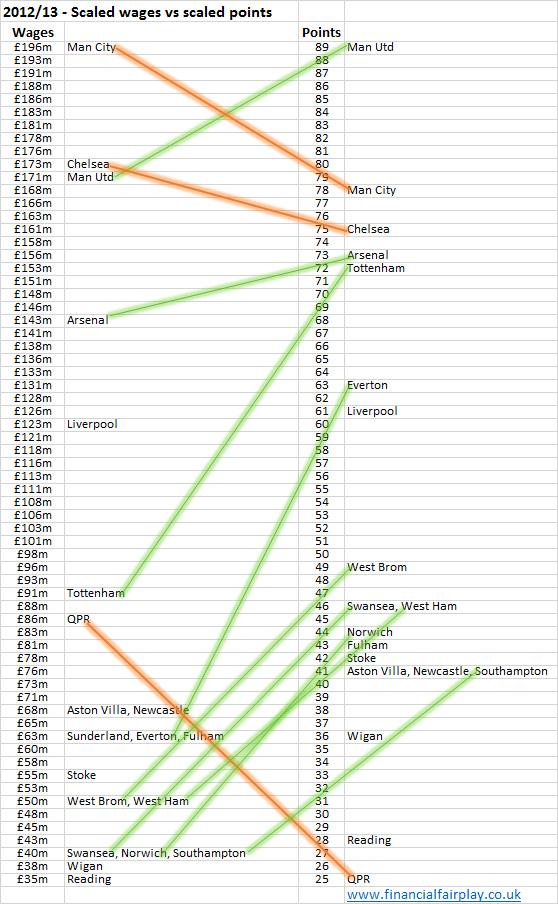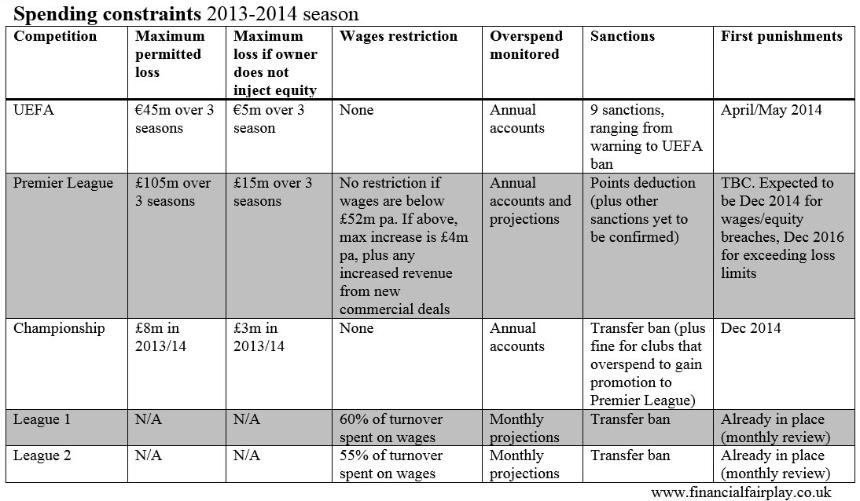All eyes on Manchester City's FFP results
November 27, 2013Updated 1/12/13
During the next two or three weeks Manchester City will publish their accounts for the 2012/13 season. Like several PL clubs with a bad set of results, City published their previous accounts on a Friday afternoon (when then knew journalistic attention would be kept to a minimum; a practice I highlighted here). Although I expect the accounts to improve, given that this forthcoming set of accounts will complete the FFP jigsaw it will be interesting to see if City repeat the practice this year.
UEFA's FFP rules require clubs to keep losses below 45m euros over two seasons (2011/12 an & 2012/3). The upcoming results will therefore complete the FFP picture and, in theory at least, we should be able to tell if the high-spending club have passed the test.
However, unless City have significantly changed their approach to financial disclosure, journalists are likely to struggle to determine whether City's results mean a Pass or Fail. The FFP rules are fairly complicated and a number of elements that are not shown separately in the accounts can be excluded from the Break Even test. In addition, City's previous accounts, whilst in keeping with permitted accounting practices, include some revenue and expense items that require adjustments to comply with the FFP requirements.
Although we can hope that City will produce a formal FFP statement as part of their accounts explaining their Break Even Result, past events suggest the club are more likely to produce an unhelpful but optimistic 'fudging' statement.
To help analysis of City's accounts, I have produced an interactive calculator (which unfortunately doesn't work too well on a mobile device).
Things to watch out for
City will aim to put as positive a spin as possible on the results so we can probably expect some 'window dressing' items in the account. It is possible that the club will repeat the 2011/12 accounts and again sell some unspecified 'Intellectual Property/Know How' to the club owners as a 'Related Party Transaction'. See Note 4 below for an explanation of how this needs to be treated.
Any significant change in club wages will need to be watched closely. Club wages were £201.8m in 2011/12 and we shouldn't expect them to reduce significantly (probably 10% maximum). The Independent reported that City were aiming to put some wage costs through a separate company as a way to help the club break even. However, even if the club do this, the FFP rules require all wages and costs to be included - ultimately UEFA would simply add any excluded wages back into the Break Even calculation.
Instructions
When City's Loss (or Profit) Before Tax is announced simply input it into the orange box below. I expect the figure to be a Loss rather than a profit so enter a loss as a minus figure. I have pre-populated this orange field with the figure City probably need to hit to meet the FFP requirements in a 'best case' scenario. Just double-click on the field and enter the correct figure. Depending on the contents of City's accounts, you might only need to amend the orange cell to generate the likely FFP result.
Any yellow field can be overwritten if necessary. The Notes explain each item and why I have pre-populated the calculator with that figure.
Input City's Loss Before Tax as a minus figure in the 2012/13 cell. The 2011/12 figure should not be overwritten as it is the actual figure from the published accounts.
Note 2
Club accounts do not breakdown all the figures that UEFA allows to be excluded from the Break Even test. However, last year, City announced that £15m could be excluded from their 2011/12 accounts. One of the permitted exclusions is for finance costs relating to fixed assets - this figure was listed as 'Depreciation' in the 2011/12 accounts (£6.6m). I have therefore apportioned the remaining £8.4m in 2011/12 on a 'best guess' basis to the permitted exclusions of Youth Development and Community Development. For 2012/13, key in the Depreciation figure (and any other expressly mentioned Finance costs relating to Fixed Assets if there are any). Unless the report mentions otherwise, another £8.4m split between Youth & Community is probably going to be about right. During the last year, City have spent heavily on the Academy development so the exclusion might be higher than the previous year (but if so, would expect this to be mentioned in the accounts).
Note 3
UEFA will make a number of adjustments to allow for any overstated revenue items or understated expenditure items. Although I contend that Etihad could almost certainly have secured the same sponsorship deal for less (if it had wanted), the deal is so complicated that UEFA will struggle to apply a Fair Value reduction to this deal. It has also not been classed as a Related Party Transaction by the club accountants. Unless CFCB panel who oversee FFP compliance disagree, the figure can't be amended. Subsequent deals at other clubs have also brought the Etihad deal closer to a true commercial level and I have therefore assumed that there is no adjustment made by UEFA.
Note 4
The 2011/12 accounts tell us that City were paid £12.8m by the club owners for Intellectual Property and Know How - the club have not disclosed what this 'Related Party Transaction' relates to. However, I am advised by an excellent source that this item probably wouldn't withstand a firm challenge if one were to be mounted. If you feel this will be challenged, you should enter the figure you think is an appropriate adjustment.
Note 5
In the season immediately before FFP started (2010/11), Man City wrote-off £34.4m of player contracts. This had the effect of reducing the players Book Value (and Amortisation) to zero for future years.
Swiss Rambler believes Santa Cruz and Bridge are included in this figure. Although this 'write-down' is perfectly acceptable for accounting purposes, under the FFP rules a player technically has to be amortised evenly over the life of the contract (i.e. until the contract ceases to exist). Although UEFA would be able to adjust for this amount if it wished. Swiss Rambler believes this is unlikely as City could justify the treatment and they would not be considered to have 'taken the mickey' out of the FFP rules. If you believe an adjustment will be made by UEFA, enter 6.5m in each of the two seasons.
Note 6
The 'Other' field may not be required - it will only been needed if City report income in the Profit and Loss account from a source that is not permitted under FFP rules (eg a gift to the club from the owner's family).
Note 7
UEFA allows clubs to make an acceptable level of loss over the two seasons combined. The permitted € 45m was the equivalent to £38.48m in June 2010 when the rules were agreed but due to changes in the exchange rate was worth £36.69m as at the City's 31 May account cut-off in 2013. The FFP rules contain a provision that requires UEFA to look favourably on any club that fails due to exchange rate fluctuations. For all practical purposes City can make a good case for using the more lenient figure of £38.48m as their maximum permitted deficit.
Note 8
Annex X is an appendix to the FFP rules that allows a club to deduct the value of the wages paid in the 2011/12 season to players on pre-June 2010 contracts. The exclusion can only be applied if the Break Even Deficit figure is improving. City previously advised that £80m of wages costs fell into this category. Although this seems rather high, I have left the £80m figure in the box. If you feel it should be a lower figure, amend it.
Punishments
Although UEFA has published 9 punishments for clubs that fail the FFP test, it has not published a tariff to explain how the punishments will be applied. UEFA has intimated that clubs that exceed the threshold by more than 20% will face the more severe sanctions. Should City fail, they will find out their punishment at the end of April/start of May 2014.
Posted by Ed Thompson.



